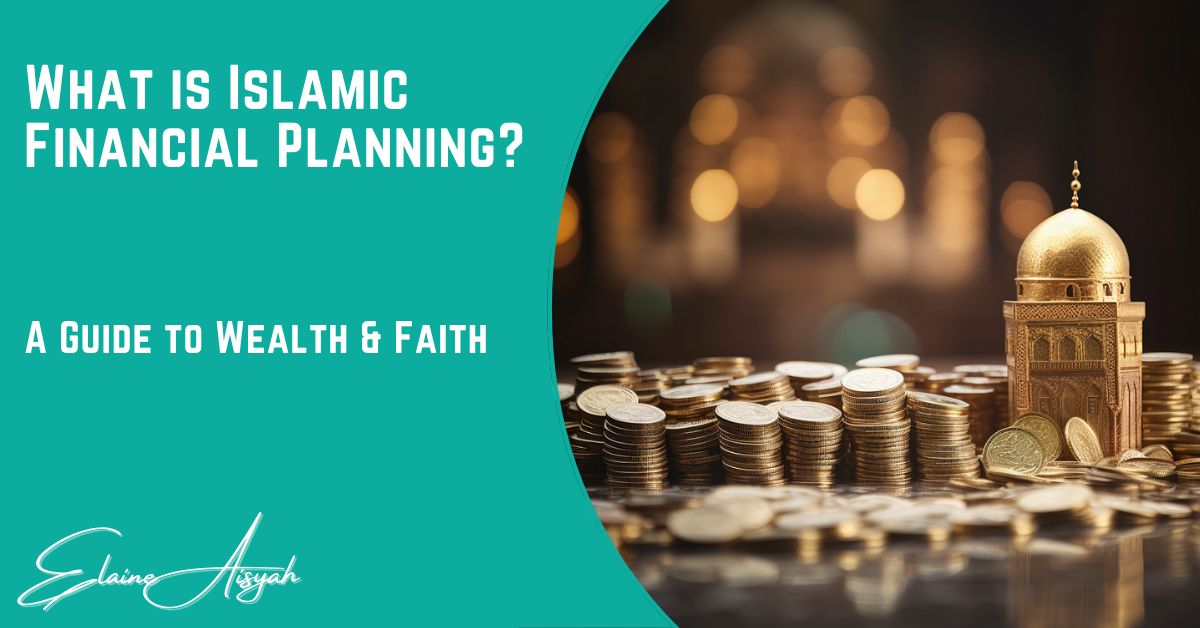Islamic financial planning isn’t just about handling money within the confines of Islamic law. It is a comprehensive approach that aligns a person’s financial life with their faith, ensuring every action reflects their religious beliefs and values. This planning covers everything from how you earn your income to how you spend it on.
In a world that is rapidly evolving financially, understanding Islamic financial planning is crucial. Unlike conventional financial systems that prioritize profit above all, Islamic financial planning focuses on ethical considerations. Its foundation is built upon key principles like the prohibition of Riba, which is essentially interest, and ensuring that money isn’t made from Haram, or forbidden activities. These principles emphasize fairness, transparency, and social responsibility.
With the modern economic landscape being so interconnected and complex, Islamic finance offers a unique perspective. Beyond its ethical dimensions, this approach serves as a viable alternative, one that advocates for stability and sustainability. Seeing how these principles integrate modern-day financial needs with timeless religious values marks Islamic financial planning as not just relevant, but essential.
To grasp the full breadth of Islamic financial planning, there’s a need to understand its core principles and how they influence every aspect of financial management. The approach doesn’t just dictate what to avoid, but it guides what to embrace, mapping out a path that respects both financial goals and religious commitments.
Core Principles of Islamic Financial Planning
Understanding the core principles of Islamic financial planning is essential for anyone looking to align their financial decisions with Islamic values. At the heart of Islamic finance lie rules and principles that offer a distinct and invaluable approach to money management.

One of the cornerstone principles is the prohibition of Riba, which translates to any form of interest on loans. In Islamic finance, earning interest is considered exploitative, as it benefits one party at the expense of another. Instead, the system encourages profit-sharing models, where both parties share in the risks and rewards. This encourages fairness and partnership, fostering a more equitable financial environment.
Another key principle is ethical investing. Unlike conventional finance that sometimes disregards the source of profit, Islamic financial planning insists on avoiding Haram activities. This means steering clear of investments in businesses dealing with alcohol, gambling, and other non-compliant sectors. The focus is on ensuring that money circulates in businesses that positively impact society and adhere to Islamic ethics.
Risk-sharing is also a fundamental aspect. Rather than transferring risks through derivatives and hedging—practices common in conventional finance—Islamic finance advocates for risk-sharing. This aligns with the concept of mutual cooperation, where financial transactions involve transparency and shared responsibilities. It supports a more stable financial environment that’s less prone to speculative bubbles and crises.
Embracing these principles is more than just financial compliance; it’s about integrating ethical considerations into every financial activity. This distinction makes Islamic financial planning not only unique but adept at creating both spiritual and worldly value. For anyone navigating this path, these principles serve as a compass, guiding towards financially sound and ethically responsible choices.
Key Components of an Islamic Financial Plan
Crafting an Islamic financial plan involves more than just basic budgeting; it’s about creating a strategy that aligns financial aspirations with Islamic values. This process begins with a clear understanding of your financial goals within the context of your faith.
Setting Islamic-compliant financial goals is crucial. Goals should take into account Halal income and expenditures, ensuring that each financial move reflects your religious beliefs. Whether it’s saving for education, a home, or retirement, the allocation of funds needs careful consideration to make sure they’re used in permissible ways.
Savings strategies should focus on accumulating wealth through Halal means. This involves earning through prescribed methods and ensuring savings are in avenues compliant with Islamic law. For instance, investing in Sharia-compliant funds or participating in profit-sharing agreements can be beneficial for growth while adhering to ethical guidelines.
Asset allocation is another critical component, as it determines how your investments are spread across various asset classes. Within Islamic financial planning, choosing investments like Sukuk (Islamic bonds) or Sharia-compliant equities ensures that your wealth accumulation practices adhere to religious directives. These investment vehicles offer growth potential while avoiding prohibited activities.
Each of these components plays a role in crafting a holistic financial strategy. When you bring them together under the umbrella of Islamic values, you’re not only securing your financial future but doing so in a way that aligns with your faith. This comprehensive approach ensures your financial path is both prosperous and principled.
Investment Options in Islamic Finance
Delving into investment opportunities within Islamic finance unveils a spectrum of Sharia-compliant products that respect both faith and financial returns. These options provide a chance to grow wealth while adhering to Islamic law, ensuring that ethical standards are met.
Among these options, Sukuk stands out as a prominent choice. Sukuk, often referred to as Islamic bonds, offers a Sharia-compliant alternative to conventional bonds. Unlike their traditional counterparts that generate income through interest, Sukuk provide returns through profit-sharing and ownership structures. This makes them a key asset for any Islamic portfolio, offering regular and predictable income streams.
Investment in real estate also plays a significant role, given its tangible nature and the potential to generate rental income. Real estate aligns well with Islamic principles, avoiding the complexity often found in financial derivatives. Whether through direct ownership or investment in real estate funds that comply with Islamic law, property investment remains a solid option.
Sharia-compliant equity funds present another path for diversification. These funds invest in companies operating within Halal industries, excluding businesses associated with prohibited activities like alcohol and gambling. By focusing on equities that comply with those standards, investors can enjoy the benefits of stock market gains while maintaining ethical rigour.
Commodities, particularly precious metals like gold, also feature in Islamic finance as reliable long-term investments. These assets provide stability and offer a hedge against inflation, making them valuable components of a diversified Islamic portfolio.
Each investment avenue requires careful consideration of personal goals and risk tolerance. Professionals in the field can guide individuals in creating a balanced portfolio that aligns both financial aspirations and religious obligations. Choosing the right mix of Sukuk, equities, real estate, and commodities can ensure a robust and compliant financial strategy.
Managing Risks in Islamic Financial Planning
In the world of finance, risk is an ever-present companion, and managing it effectively is crucial. Islamic financial planning incorporates unique strategies to address these risks while staying true to Islamic principles.
Risk mitigation in this context involves adhering to transparent and ethical financial practices. Trust, fairness, and shared responsibility underlie every decision, creating a system that’s naturally more resistant to excessive risk-taking. This is particularly evident in profit-sharing agreements and joint investments, where sharing both the risks and rewards leads to more ethical and balanced outcomes.
Takaful, or Islamic insurance, represents another vital tool in the risk management arsenal. Unlike conventional insurance based on risk transfer, Takaful operates on a mutual cooperation model.

Members contribute to a pool, and any claims are paid out from this collective fund. It embodies the principle of mutual assistance, providing coverage while fostering a sense of community and shared responsibility.
Lessons from global financial crises have underscored the importance of these principles. By avoiding speculative instruments and ensuring compliance with Sharia, Islamic finance creates a buffer against the type of systemic risks that have often led to financial turmoil in conventional systems.
Utilizing these risk management strategies requires an understanding of both Islamic law and financial principles.
Engaging with knowledgeable advisors and exploring Takaful options can significantly boost the resiliency of your financial plan, ensuring that it remains robust and ethically aligned.
Challenges In Islamic Financial Planning
Navigating the path of Islamic financial planning isn’t without its share of hurdles. One of the biggest challenges is dispelling misconceptions about what Islamic finance truly involves.
Many harbour misunderstandings, often equating it to traditional finance with just a religious label, whereas it’s actually centered around deeper ethical principles.
Regulatory issues also pose significant obstacles. With different countries applying varying interpretations of Sharia, consistent regulatory frameworks are often lacking, making it difficult for practitioners to standardize services internationally.
This fragmentation can hinder the seamless implementation of Islamic financial products, affecting growth and global reach.
Balancing traditional Islamic values with modern financial demands is another challenge. As the financial landscape rapidly evolves, integrating cutting-edge financial services with traditional Islamic principles can be tricky.
Innovations like digital banking and fintech push the boundaries of conventional and Islamic finance alike, creating tension between tradition and innovation.

Moreover, education and advocacy play a crucial role in demystifying Islamic finance for both practitioners and consumers, fostering broader acceptance and more informed participation.
Addressing these challenges requires a concerted effort from both regulators and financial planners. Increased dialogue between international Islamic finance bodies could help establish common standards and practices.
Influence and Integration of Technology
Technology is playing a transformative role in the field of Islamic financial planning. The advent of digital solutions is reshaping how financial services are offered and consumed, pushing the boundaries of traditional practices while staying true to Islamic principles.
FinTech innovations are at the forefront, introducing platforms that facilitate seamless and Sharia-compliant transactions. Digital banking services catering specifically to Islamic finance are becoming increasingly popular, offering features like digital wallets and online investment options tailored to meet the demands of modern consumers without compromising Islamic guidelines.

Blockchain technology is another game-changer, introducing transparency and security to Islamic finance. Smart contracts can ensure that financial agreements comply with Islamic law, minimizing the risk of non-compliance and fostering trust between parties. This technological advancement reduces manual processes and potential errors, making financial services more efficient and reliable.
Artificial Intelligence (AI) is paving new pathways in personal financial planning by providing enhanced consumer insights and personalized service delivery. AI-powered tools can assess financial products for compliance, guiding clients in crafting a plan that aligns with both their personal goals and religious commitments.
Embracing these technological advancements requires adapting to new tools while ensuring they support spiritual and financial objectives. Collaborating with tech-savvy advisers familiar with both Islamic finance and modern technology can be invaluable, unlocking new opportunities to expand horizons and optimize financial well-being in a faith-aligned manner.
Conclusion: The Future of Islamic Financial Planning
As we look ahead, Islamic financial planning is poised for significant growth and innovation. The future holds great promise as more individuals and institutions seek ethical and sustainable financial solutions that align with Islamic principles.
One of the driving forces behind this growth is the increasing global awareness and acceptance of Islamic finance. People are recognizing its value not just within Muslim communities but across diverse populations seeking ethical alternatives to conventional finance. This shift is likely to continue expanding, presenting opportunities for broader adoption and integration.
Global opportunities abound, particularly in emerging markets where there is growing demand for Islamic financial products. By offering tailored solutions that address both religious and modern financial needs, these markets can unlock vast potential. The industry’s growth hinges on creative, adaptive strategies that can cater to evolving societal needs while holding steadfast in its core values.

Education and awareness are key factors in shaping the future landscape. As more educational resources become available, potential investors and practitioners can better understand the benefits and mechanisms of Islamic finance. Promoting knowledge is essential for inspiring confidence and fostering widespread participation.
The future of Islamic financial planning looks bright, with technology and innovation paving the way for unprecedented advancements. By staying committed to its principles while embracing change, Islamic finance can continue offering viable, inclusive solutions that resonate with ethical investors worldwide.
To understand more about Islamic Finance, let’s have a chat! Click on the button below to WhatsApp me!
